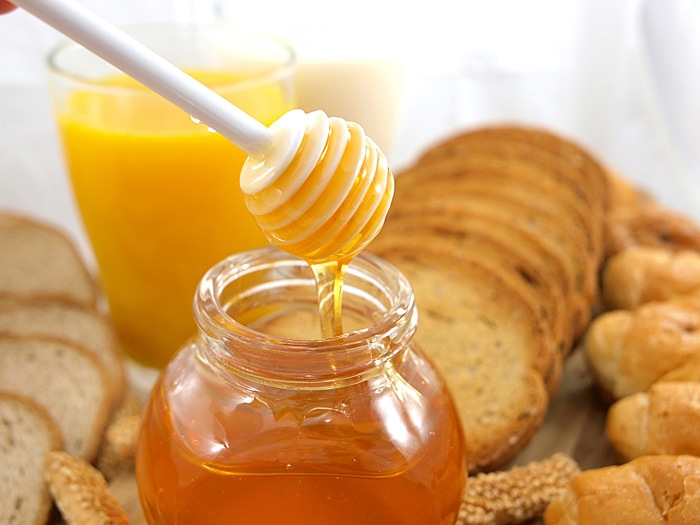
Written By: Sofia Layarda, MPH
Title: Master of Public Health
Alumni: University of California, Berkeley
Last Updated on:

An alternative sweetener to regular table sugar, honey has a long-standing history of being used in traditional or folk medicine. Calorically, 1 tablespoon of honey contains 64 kcal (compared to 46 kcal for the same amount of sugar). So is honey any better than sugar?

Table of Contents
Studies have documented the ability of some types of honey to inhibit growth of dangerous antibiotic-resistant bacteria. The mechanism by which honey acts as an antibacterial agent is not fully understood. First, the sugars in honey draw away moisture, which helps inhibit bacterial growth. In addition, honeys with strong antibacterial activity contain compounds that are known to be toxic to bacteria, such as methylglyoxal in manuka honey or hydrogen peroxide in others. Interestingly, a 2011 study out of the University of Amsterdam that compared the antibacterial activities of two medical-grade honeys found that the antibacterial activities of manuka honey continued even after the methylglyoxal was neutralized, meaning there were other unknown factors that contributed to the antibacterial capacity.
Raw unpasteurized honey contains various phytonutrients that have been shown to exhibit anti-cancer properties. However, processing and heat applied during pasteurization destroy most of these phytonutrients. A 2009 study in the Journal of Agricultural and Food Chemistry found that darker honeys such as buckwheat, blueberry, manuka, or eucalyptus exhibit higher antioxidant levels than lighter-colored samples.
The throat soothing properties of honey are not well-explained scientifically, but ask most singers and they swear by singers’ tea (which counts honey as one of its main ingredients) for irritated throat or squeaky voice. Many of us resort to hot tea made with lemon and honey for soothing relief of sore throat and coughs. A 2007 study from the Pennsylvania State University that compared buckwheat honey and the cough medicine dextromethorphan found that parents rated honey favorably in relieving nighttime coughing in children with upper respiratory tract infections.
A prebiotic makes your gut environment hospitable to friendly bacteria. Certain types of honey contains oligosaccharides, which appear to facilitate the growth of friendly bacteria in the gut. Some types of honey have been shown to contain friendly bacteria. However, a 2010 study in the British Journal of Nutrition found no significant change in the levels of friendly bacteria in the gut of healthy volunteers after daily consumption of honey for 4 weeks.
While honey (in particular, raw, unpasteurized honey) contains trace amounts of various compounds that exhibit beneficial properties, it is important to note that nutritionally its role is limited to a carbohydrate that contributes calories. You get more antioxidants and vitamins from fruits and vegetables. From a food safety perspective, infants under one year of age should not be served honey because of the risk of infant botulism.
Alumni: University of California, Berkeley – Sofia believes in bringing back fun and pleasure into everyday eating. She loves cooking, and is constantly experimenting with ingredients, creating recipes and trying them out on family and friends. Her latest interest lies in finding realistic and practical ways of environmentally-friendly food/eating habits.
antioxidant, honey, immune booster, prebiotics